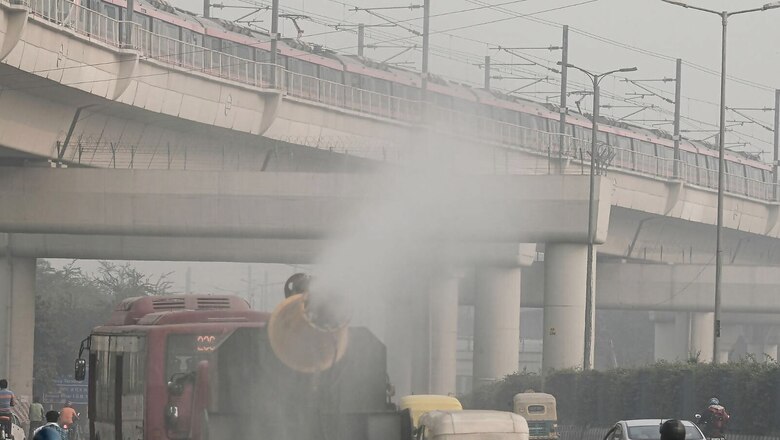
views
With a slight improvement in Delhi’s Air Quality Index (AQI) at 320 on Sunday, the NCR remained in “very poor category”. Noida and Gurugram’s AQI was recorded at 341 and 324 today. However, according to the System of Air Quality and Weather Forecasting And Research (SAFAR), Delhi will witness ‘poor’ air quality in the next two days, and moderate fog between Monday and Thursday.
The GRAP-III protocols are being implemented in Delhi, which means a ban on all construction activities except those of national importance.
According to the Commission for Air Quality Management (CAQM), “Under this (GRAP-3), all construction work will be banned except for special projects like Central Vista and other projects of national need.”
BS-III and BS-IV diesel four-wheelers in Delhi remain banned under the GRAP-3 guidelines, the environment minister had said this week.
SAFAR had noted earlier that stubble burning contributed 34% to Delhi’s PM 2.5 pollution. The National Human Rights Commission had given four weeks to the Chief Secretaries of Punjab, Haryana, Delhi and Uttar Pradesh for specific reports to check air pollution in the NCR-region, and appear before it on November 18.
What is GRAP III?
The Graded Response Action Plan (GRAP) is a set of anti-air pollution measures followed in the capital and its vicinity depending on the severity of the situation. The stage of the plan is determined on the basis of air quality in the Delhi-NCR region: Stage I – ‘Poor’ (AQI 201-300); Stage II – ‘Very Poor’ (AQI 301-400); Stage III – ‘Severe’ (AQI 401-450); and Stage IV – ‘Severe Plus’ (AQI >450).
• Under stage III, the authorities have been asked to enforce a strict ban on construction and demolition activities in the NCR, except for essential projects and non-polluting activities such as plumbing, carpentry, interior decoration and electrical works.
• The construction ban will not be applicable to projects concerning national security, defence, railways, healthcare, railways, airports, and metro rail among others.
• However, it is likely to affect housing projects in Noida, Ghaziabad, Gurugram and other areas as it entails a ban on construction and demolition activities, earthwork for excavation, boring and drilling, fabrication and welding operations, loading and unloading of construction material, transfer of raw material, including fly ash, either manually or through conveyor belts and vehicular movement on unpaved roads.
• Mining activities will not be allowed in the region.
• It also covers a ban on all operations of batching plants. Laying of sewer lines, waterline, drainage work and electric cabling through an open trench system; along with cutting and fixing of tiles, stones and other flooring materials will be prohibited in the region.
• Further, grinding activities; piling work; water proofing work; road construction and repair works, including paving of sidewalks, pathways and central verges among others will also be banned under GRAP III.
• Considering the worsening air quality, states may implement restrictions on plying of BS III petrol and BS IV diesel four-wheelers in the national capital region. However, this direction is non-binding on authorities.
• Brick kilns, hot mix plants and stone crushers not operating on clean fuels have also been banned in Delhi NCR.
• The operations of industries that are not running on approved fuels in industrial areas having PNG infrastructure and supply will be shut down. While, in industrial areas that do not have a PNG infrastructure and supply, industries not using approved fuels can operate only for five days a week.
• Under this rule, paper and pulp processing units, distilleries and captive thermal power plants will remain inoperative on Saturdays and Sundays; Paddy and rice processing units will remain inoperative on Mondays and Tuesdays; textile, garments and apparel units including dyeing processes will remain inoperative on Wednesdays and Thursdays; and other industries that do not fall under the above-noted categories will remain inoperative on Fridays and Saturdays.
• Milk and dairy units, along with industries involved in manufacturing of life-saving medical equipment, drugs and medicines have been exempt from the ban.
• In view of the depleting pollution levels, the frequency of mechanised/vacuum-based sweeping of roads has been intensified.
• Under stage III, water and dust suppressants have to be sprinkled on roads, hotspots, and heavy traffic corridors before peak traffic hours, and the collected dust has to be disposed of at designated sites or landfills.
• Authorities are required to encourage off-peak travel. For that, the frequency of public transport services can be intensified and differential rates during off-peak hours may be introduced.
What if GRAP-IV Kicks In?
GRAP-IV will include a ban on plying of four-wheeled diesel light motor vehicles in Delhi-NCR; BS-VI, essential and emergency services vehicles exempted, ban on Delhi-registered diesel-run medium and heavy goods vehicles in the capital, entry of trucks other than electric and CNG ones in Delhi; those carrying essential commodities are exempted.
Under GRAP-IV, all industries that are not running on clean fuels in NCR will be closed, even in areas, which do not have PNG infrastructure and supply. Industries such as milk and dairy units, and those involved in manufacturing life-saving medical equipment or devices, drugs, and medicines will remain exempted from the restrictions.
Read all the Latest India News here




















Comments
0 comment